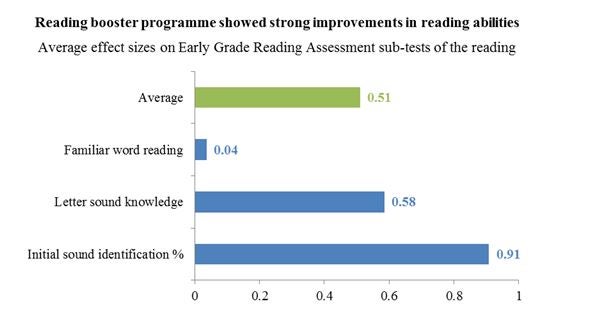
The importance of literacy for economic growth and development is already well established in economic research. Literacy enables people to access information and improve their productivity. I believe that literacy is crucial to the diffusion of new technologies, especially among the poor. It produces high economic returns, so much so that early literacy is viewed as a threshold for economic development.
Previously, I blogged about an innovative program (implemented by the World Bank and financed by the Global Partnership for Education) in Papua New Guinea (PNG) – known as READ PNG – where reading outcomes increased by 0.51 standard deviations--- a substantial increase, given its cost of $60 per student.
In 2010, the READ PNG program contained an early grade reading assessment of young elementary school students. It revealed that many students struggle with some of the most basic reading skills like knowing what letters and words sound like and the ability to read familiar words. To address these difficulties, the PNG government and the World Bank started the Reader Booster Program, a remedial reading program for young children. The program is part of the $19.2 million READ project.
Supporting teachers
The Reader Booster Program employs a new teaching technique to help students learn letter and word sounds more easily. It provides special teaching and learning materials and teacher training coupled with teacher monitoring and evaluation. Teachers in the treatment group received scripted instructional materials supported by a simple instructional model (more about this below), lesson observation with feedback from a coach, on-going remote support using mobile phone text messages, student reading books, and lesson plans.
A training model that was responsive to teachers’ needs was developed. Key elements of the training included:
- New pedagogical knowledge and skills;
- Relevant, participatory training;
- Teachers are given opportunities to practice new skills and instructional approaches;
- Regular feedback and support; and
- Monitoring of teachers as they apply their new skills in the classroom.
Students were randomly assigned, at the school level, to either a treatment group that received the program or a control group that did not. The randomized-controlled evaluation ensured that the characteristics of students in the control and treatment groups were similar. This allowed for any differences in subsequent reading skills to be attributable to the program itself.
The Early Grade Reading Assessment (EGRA) was applied both before and after the program for both the control and treatment groups. The program’s impact was significant: initial sound identification increased by 0.91 standard deviations, letter sounds knowledge increased by 0.58 standard deviations, while familiar word reading increased by 0.04 standard deviations or an average of 0.51 standard deviations for all three domains.
The link between literacy and a person’s future earnings
To put the magnitude of this impact in perspective, a review of the link between cognitive ability and earnings in several countries found that one standard deviation increase in test scores among adults corresponds to an increase of annual earnings between 17 and 22 percent on average.
In PNG, such an impact would yield additional earnings with a net present value between 5,585 PGK ($1,765) and 7,322 PGK ($2,346), discounted at 5 percent, equivalent to nine to 12 percent of lifetime earnings.
This is a remarkable benefit given that the cost of the program is only 186 PGK ($60) per student. The reading intervention boosts reading scores by 0.51 standard deviations at a cost of 186 PGK ($60) per child, thus raising reading scores by 0.009 SD per dollar.

Note: Figures are averages of the two programmes weighted by the number of treatment group children in the endline reading assessment.
I asked the World Bank’s Senior Education Specialist overseeing the program, Binh Thanh Vu, how the PNG government values this program. Vu informed me that the Government is not only proud of what has been achieved, but that the results of the pilot have had a direct impact on the development of the new Standards Based Curriculum (SBC) which the government is now implementing.
Vu went on to explain that another benefit of the PNG program is that it directly proves that reading outcomes can be measured under an education project.
I firmly believe that we need evidence of what works to improve reading proficiency in developing countries in order to build programs better. The Reading Booster program proves to be timely, relevant and cost-effective – not just for PNG, but for all countries struggling to achieve learning for all.
Check out this feature story and slideshow about READ.
Follow Harry Anthony Patrinos on Twitter at @hpatrinos .
Find out more about the World Bank Group’s work on education on Twitter and Flipboard.


Join the Conversation